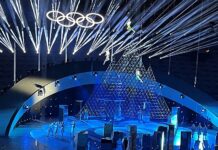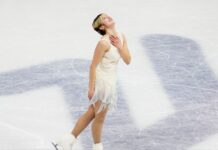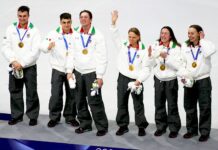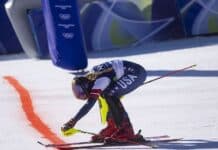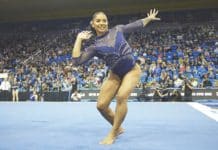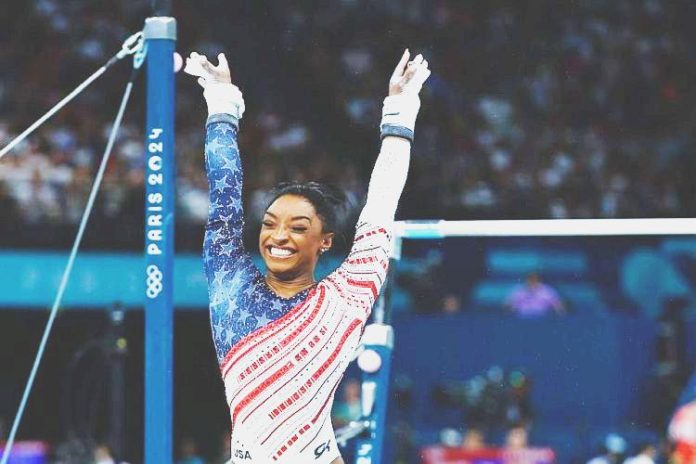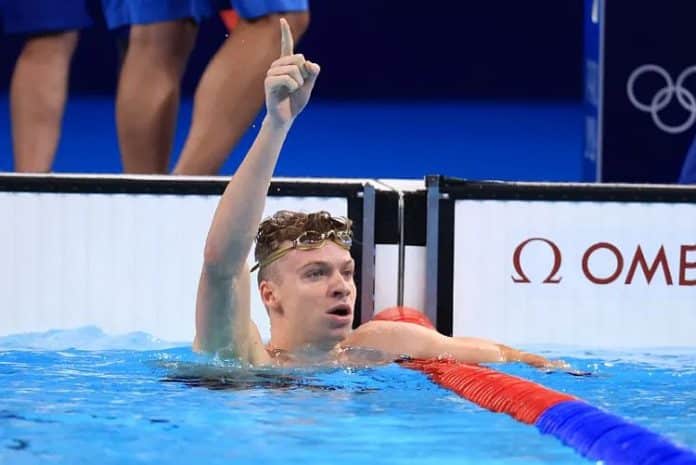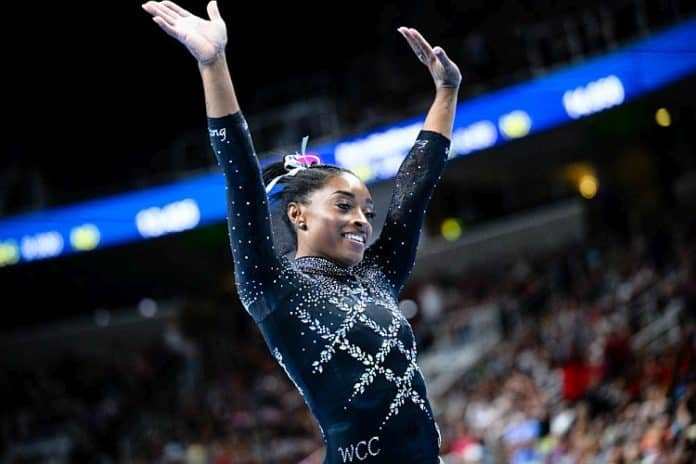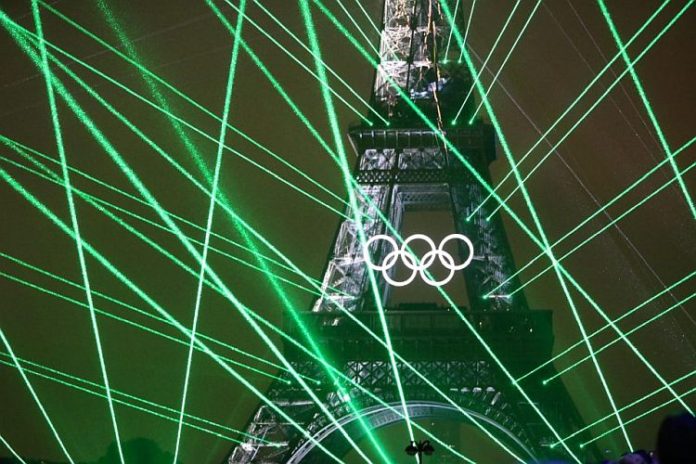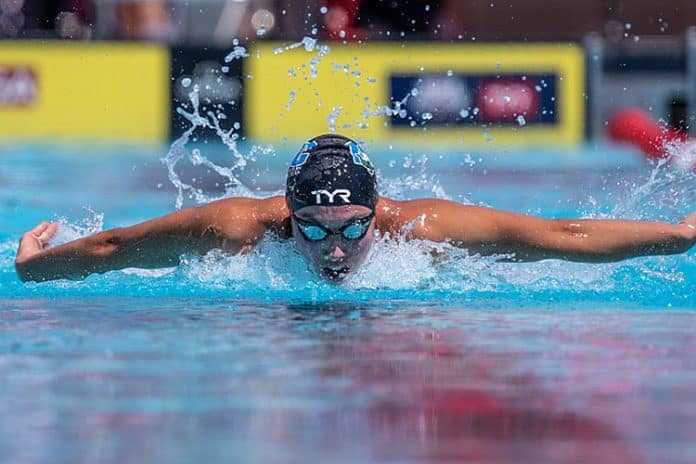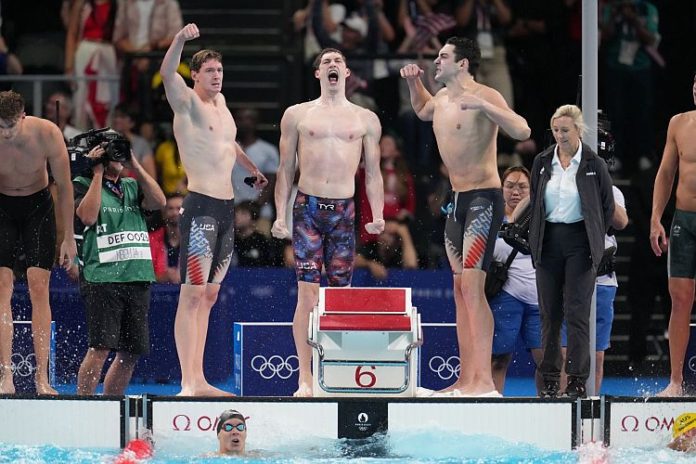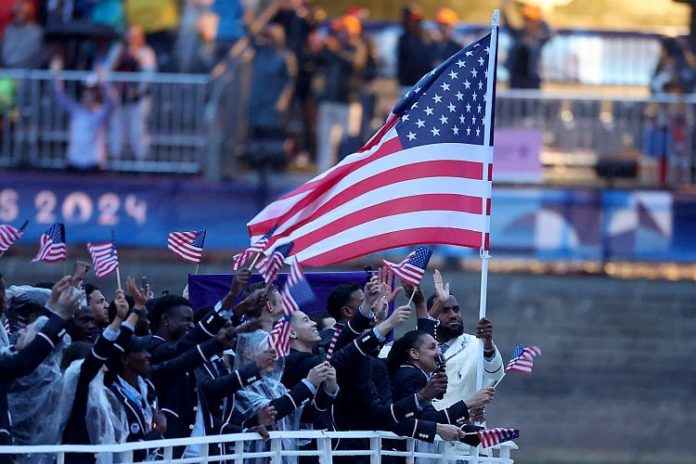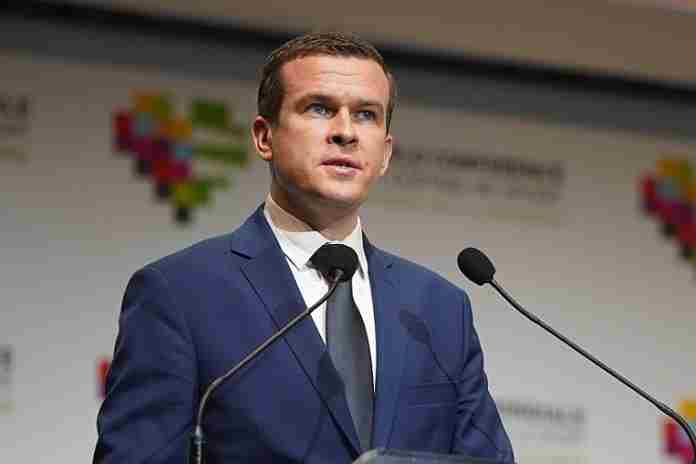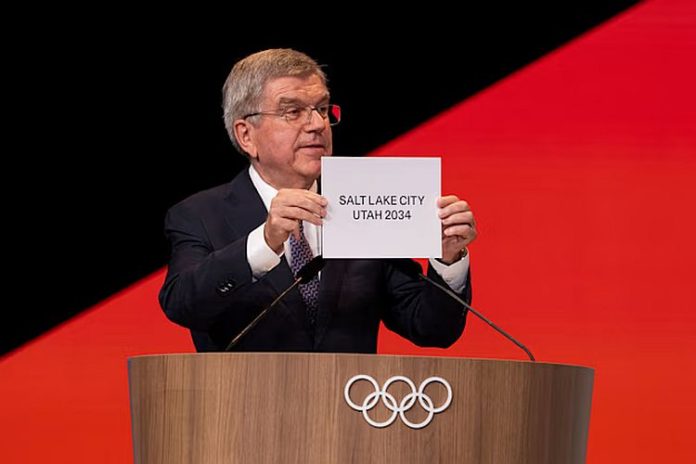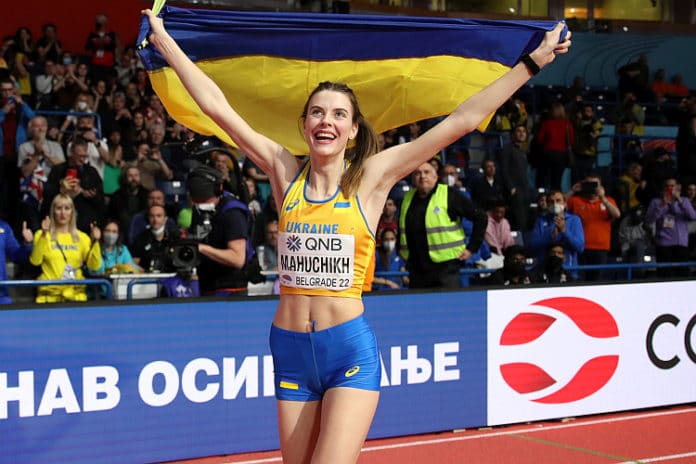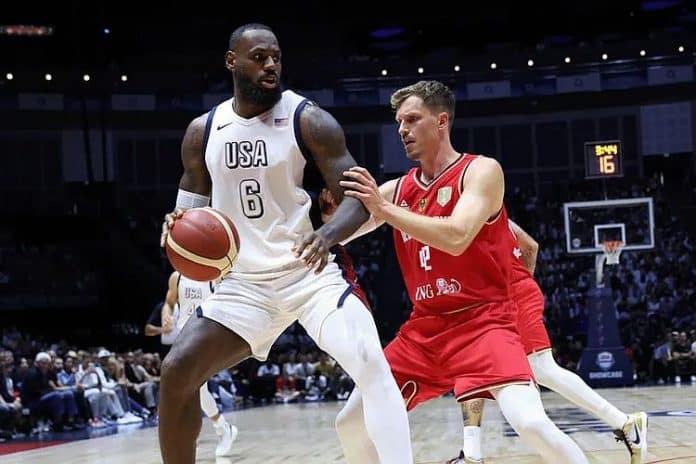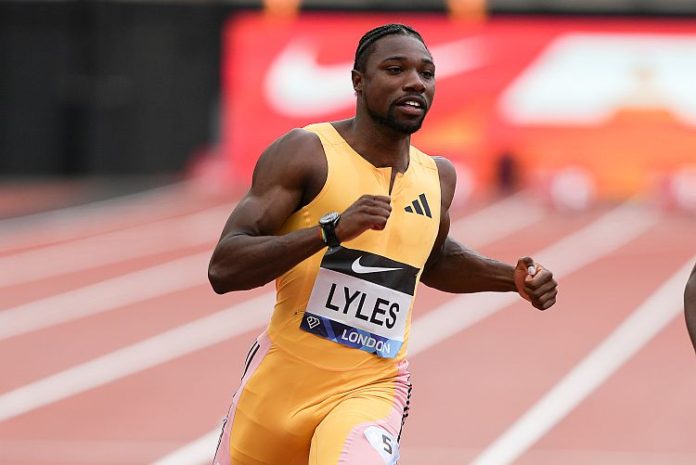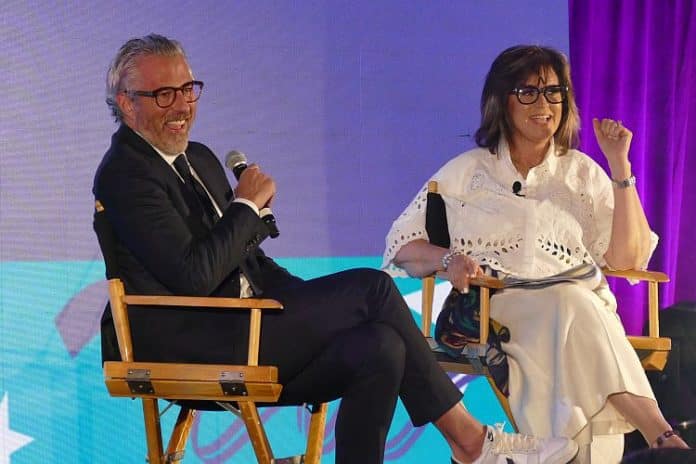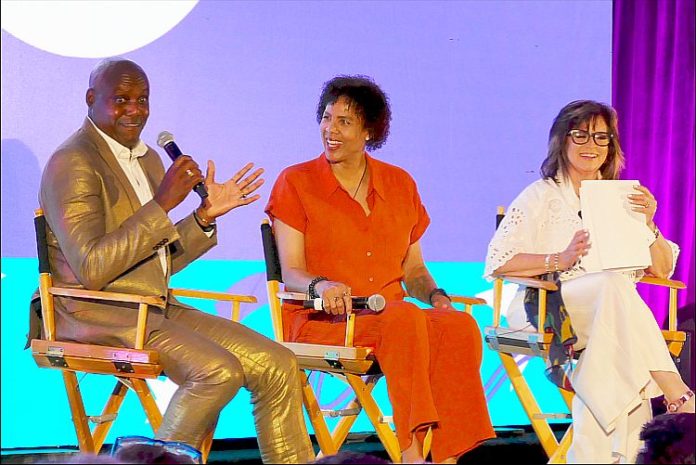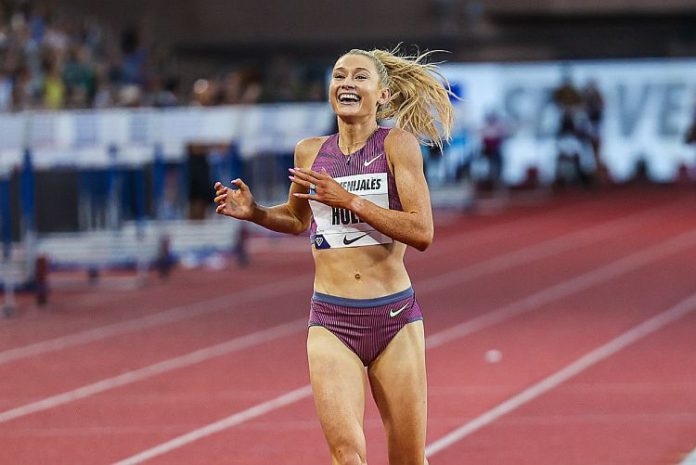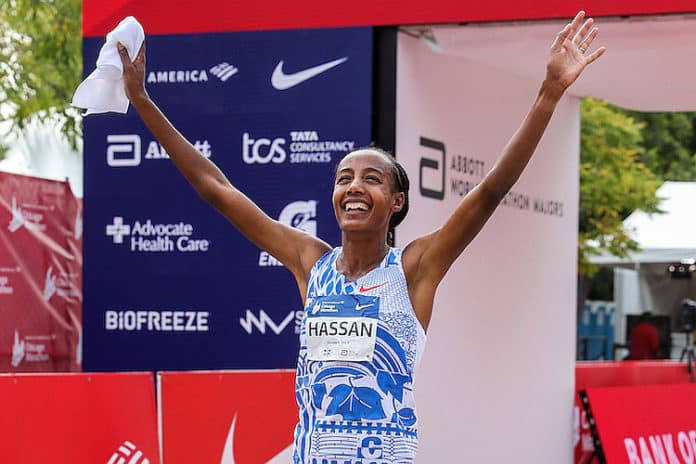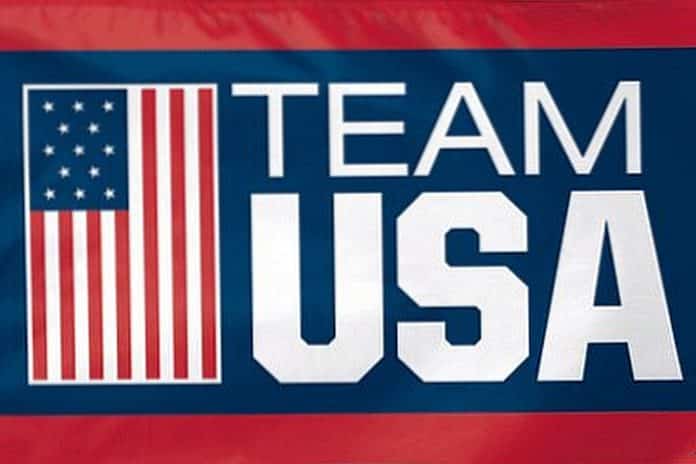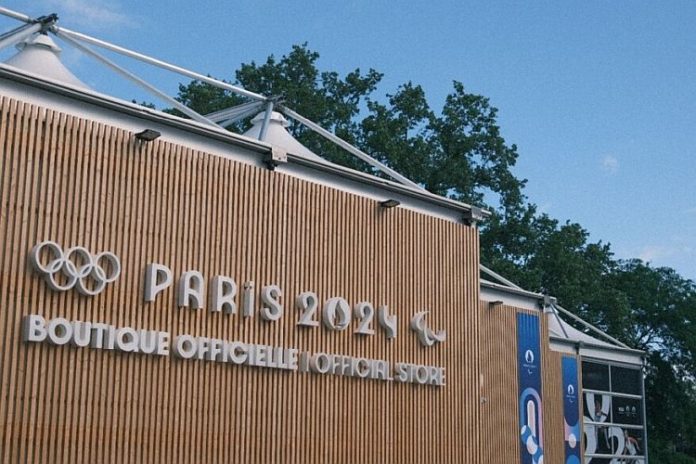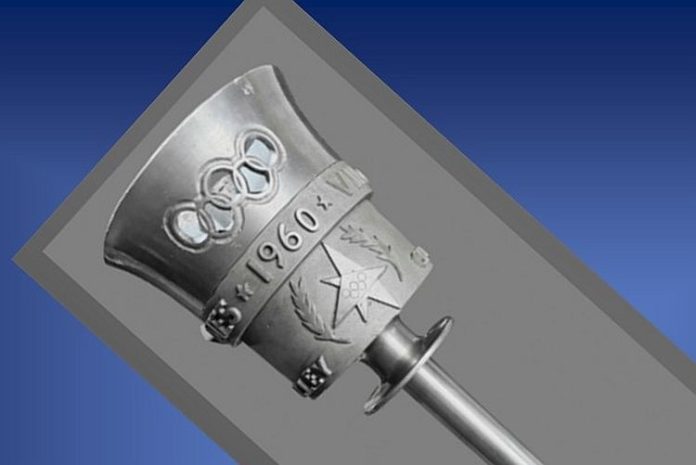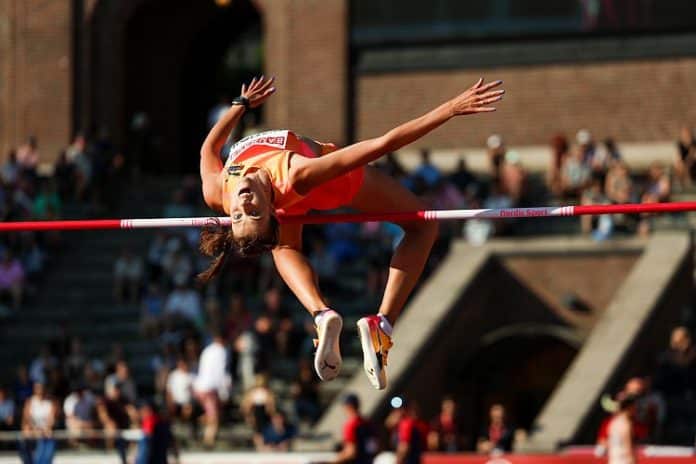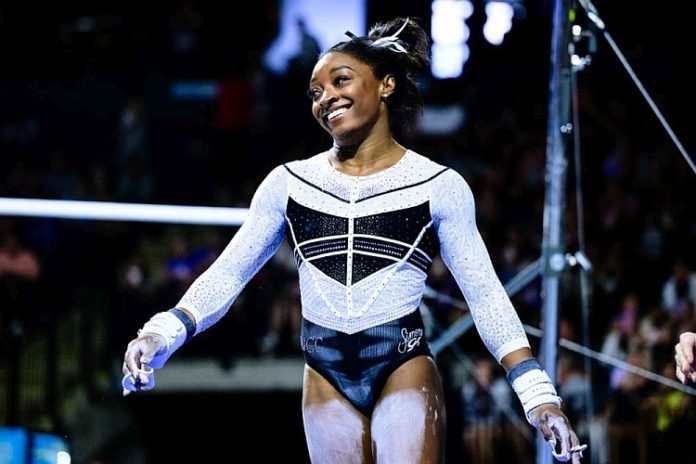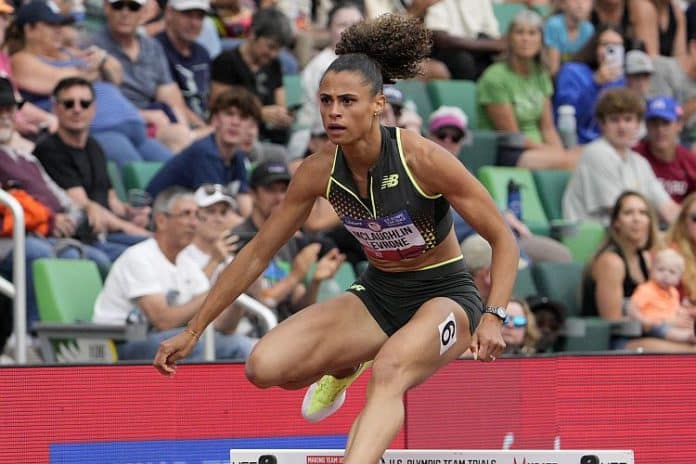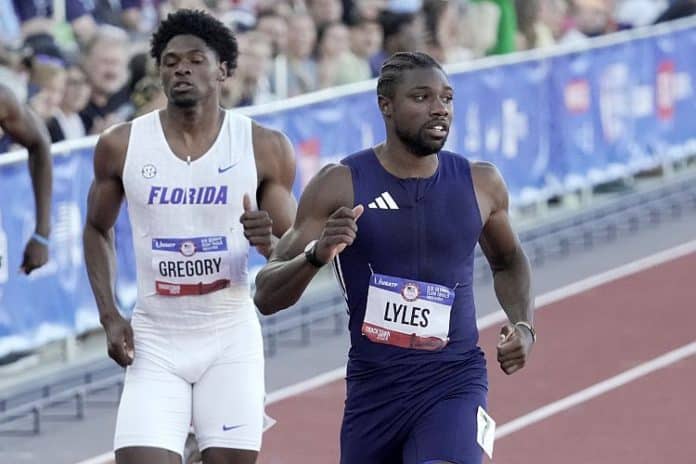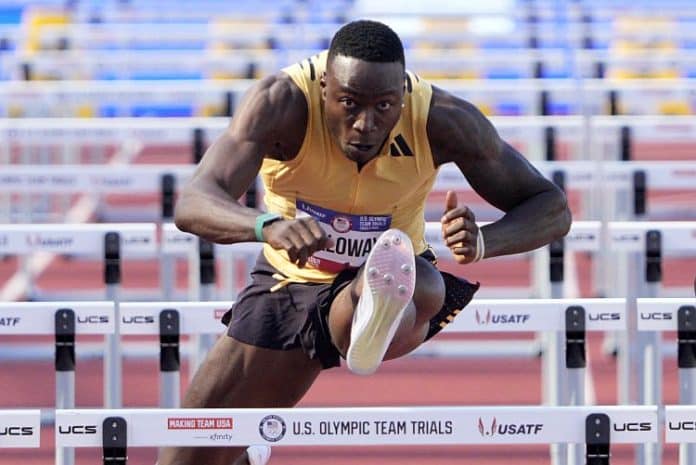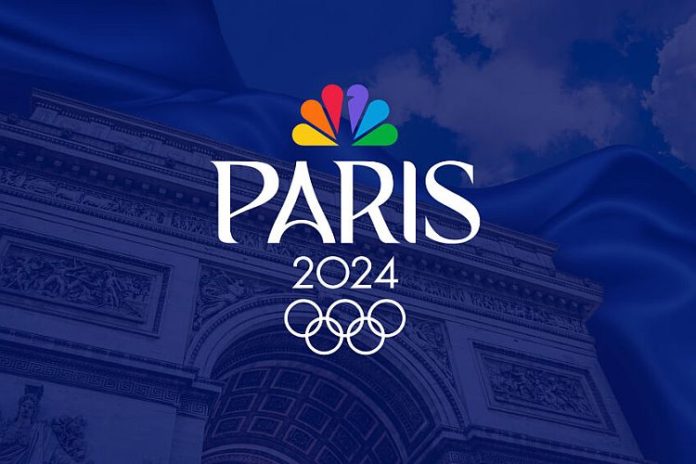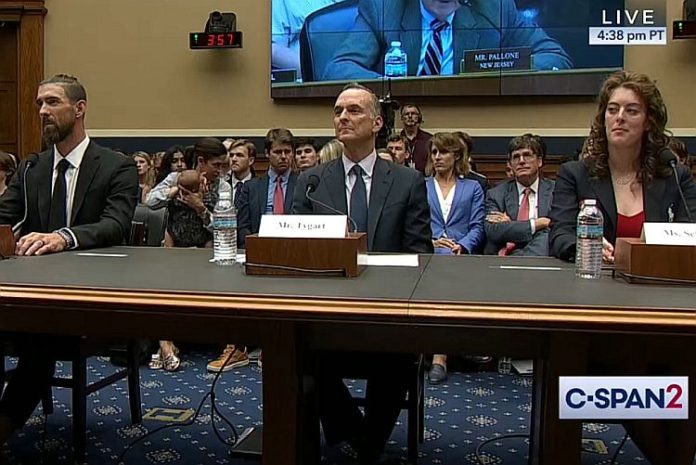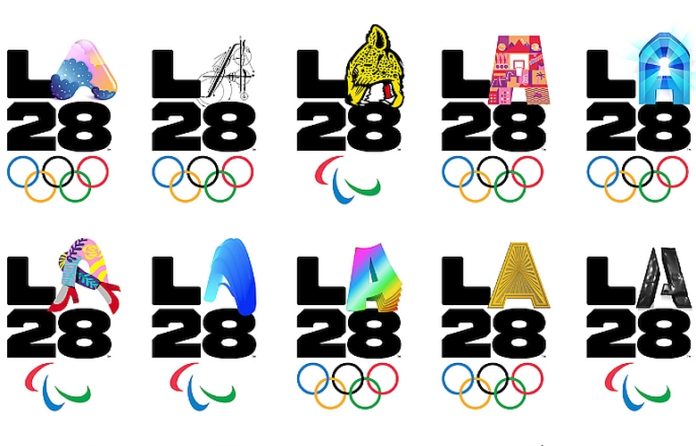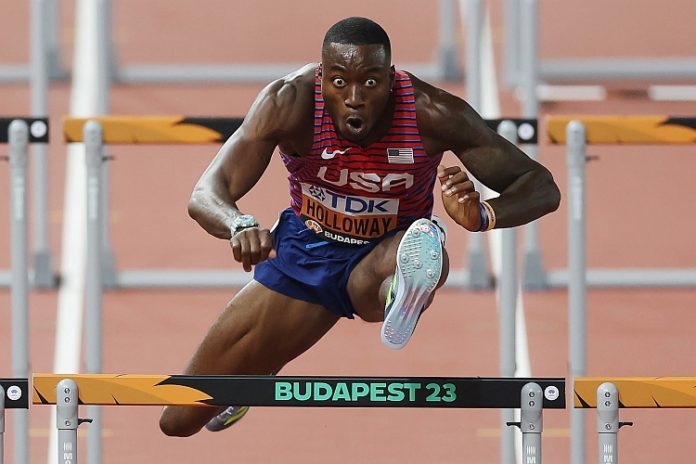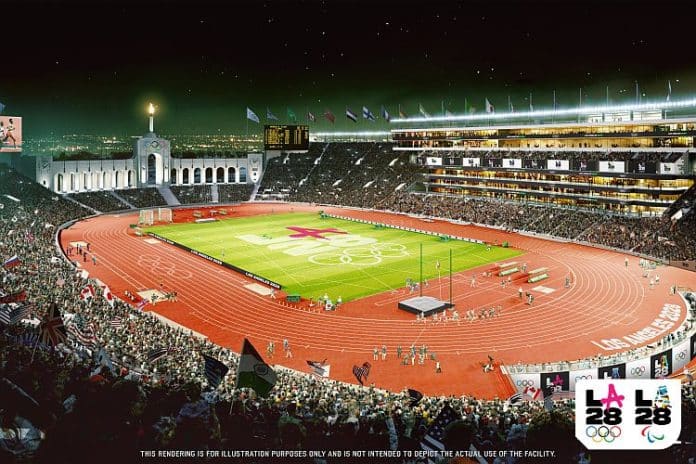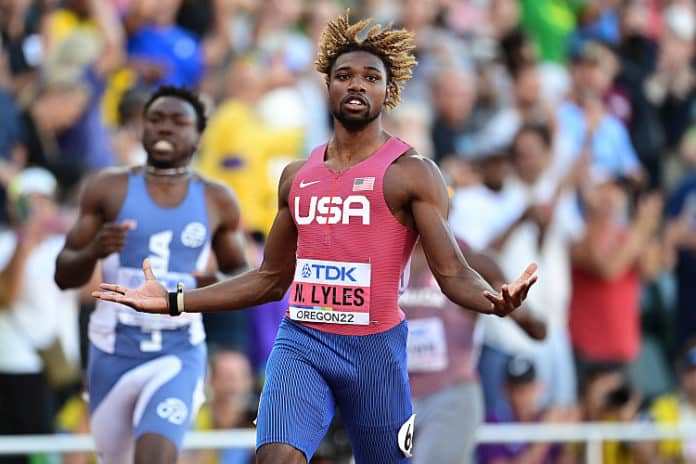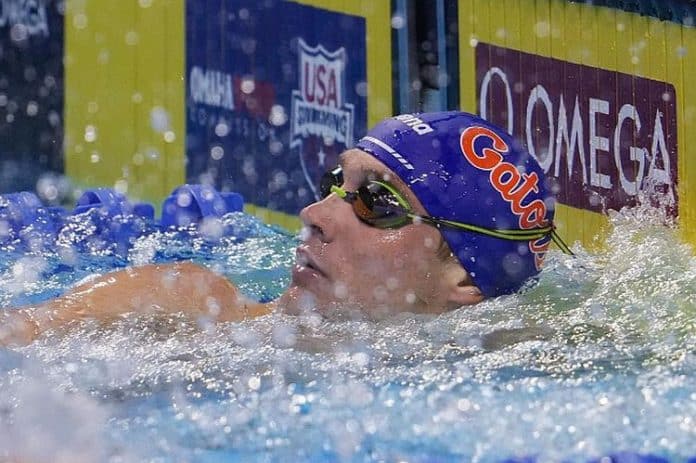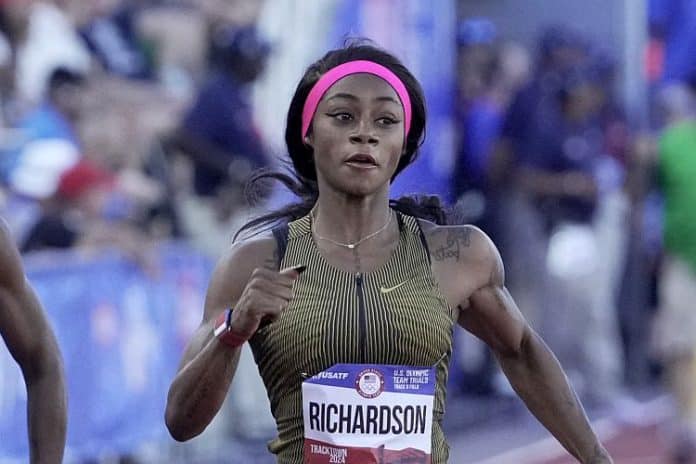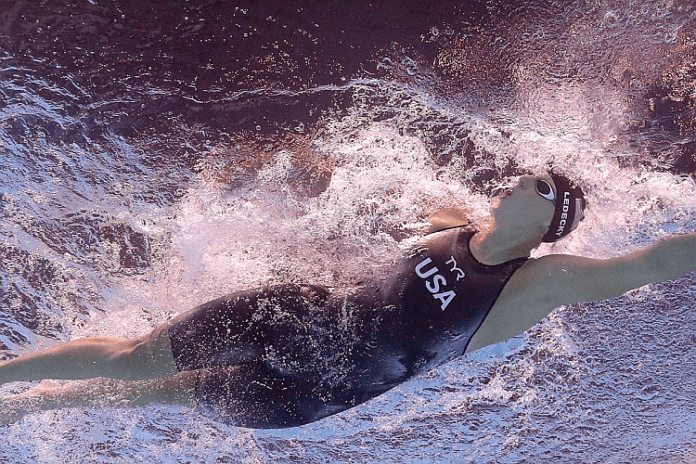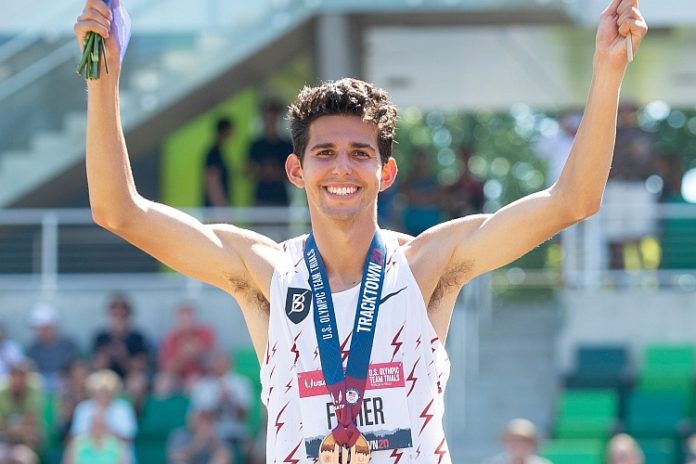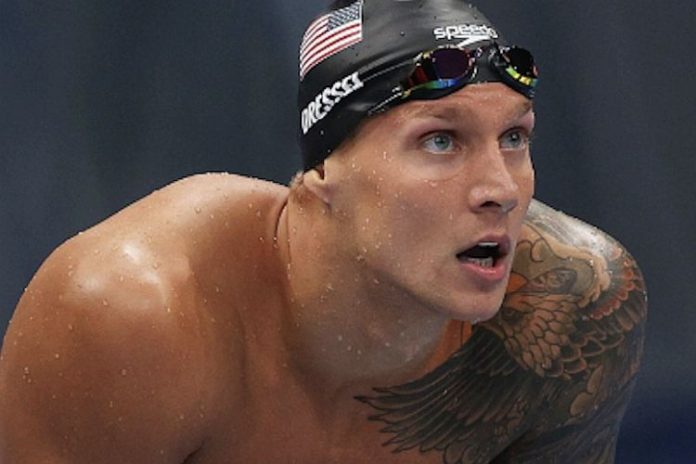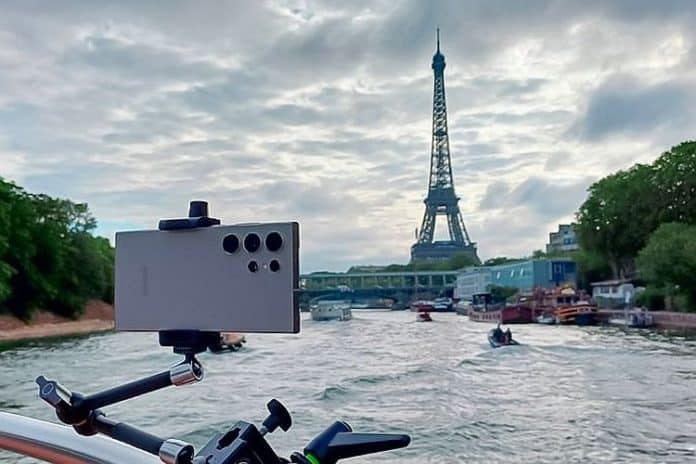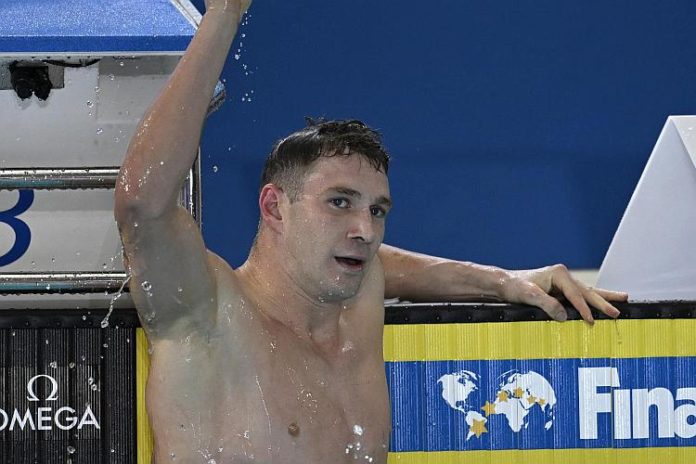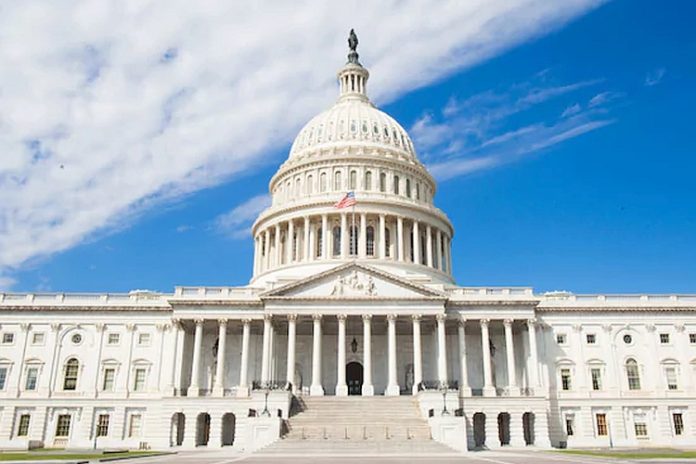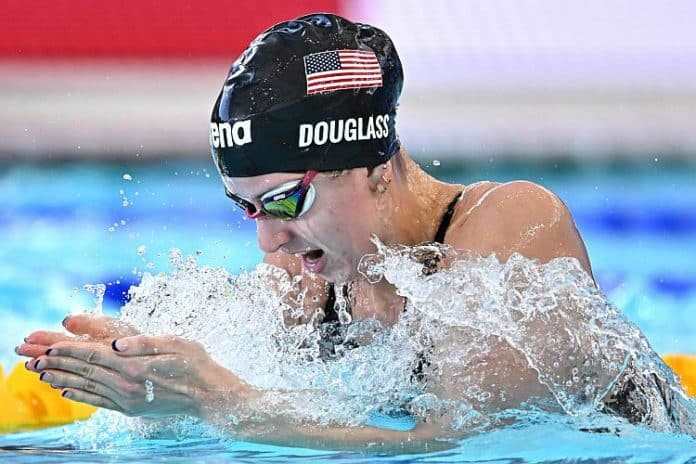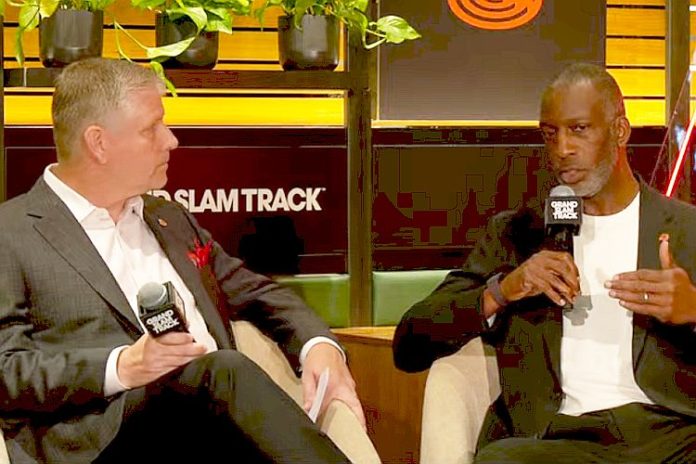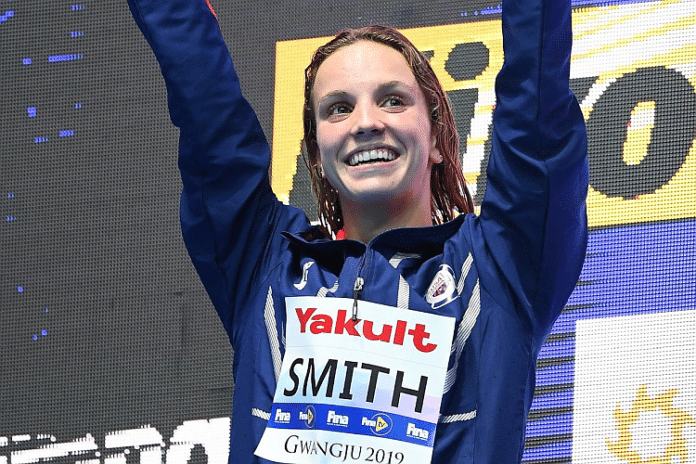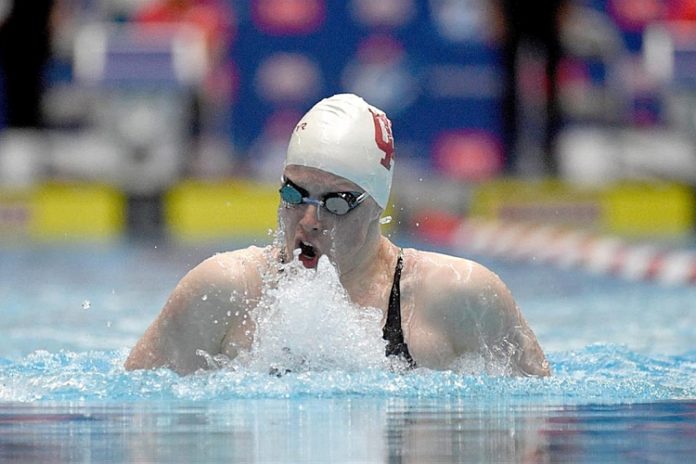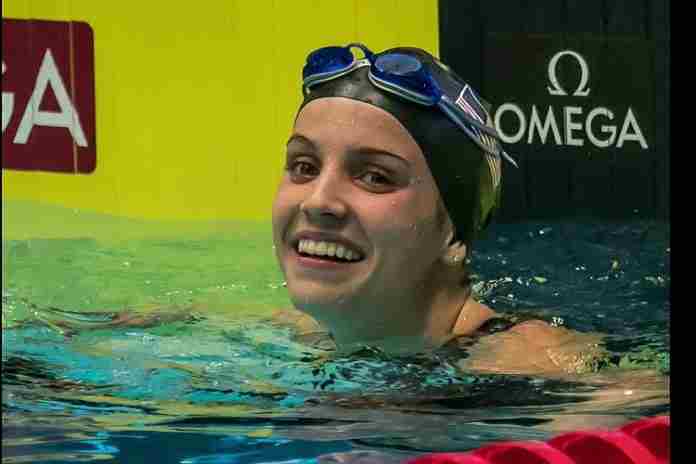★ The Sports Examiner: Chronicling the key competitive, economic and political forces shaping elite sport and the Olympic Movement.★
★ To get The Sports Examiner by e-mail: sign up here! ★
Friends: Boffo! Yes! Our 39th and 40th donors raised your giving to 101.4% of our technical costs for the rest of 2024! No complaints if you would like help get us a little ahead. We can use all the help we can get!
= PARIS 2024 =
From Lane One
Full circle for the great Simone Biles, who dominated the gymnastics world in Rio, suffered in Tokyo and then returned in Paris to win a brilliant women’s All-Around gold on Thursday. It was not easy, however.
Biles took the lead right away with a sensational 15.766, over Brazil’s Rebeca Andrade (15.100) and Kaylia Nemour (ALG: 14.033). But on the Uneven Bars, Andrade starred with a 14.066 and Biles – in her least-favorite event – scored 13.733 and Andrade had the lead at 29.766 to 29.566 for Nemour and 29.499 for Biles. Defending Olympic A-A champ Suni Lee of the U.S. sat fifth after a very nice 14.866 on Bars.
No worries, though, as Biles is great on Beam and Floor. She rebounded with an excellent, polished routine – and just one small wobble – and scored 14.566 to 14.133 for Andrade and 13.233 for Nemour. Lee scored 14.00 to move into contention for the bronze, sitting fourth behind Italy’s Alice D’Amato, 42.833 to 42.799 for Lee and Nemour.
On Floor, D’Amato, the 2024 European A-A runner-up, scored 13.500 and Nemour, the African A-A champ, scored 13.100, opening the door for Lee. She responded enthusiastically, hitting her routine and impressing the judges at 13.666 and assuring herself of no worse than the bronze.
Then came Andrade, whose spirited routine suffered from an out-of-bounds infraction on her first tumbling pass, but scored 14.033, the best so far. Then Biles was Biles on Floor, generating unequaled power on all of her tumbling passes, getting the crowd into a frenzy and scoring 15.066 to win the A-A gold after an eight-year interval.
Andrade was a clear second at 57.932, duplicating her silver from Tokyo, and Lee won her second A-A medal with the bronze at 56.465. D’Amato was fourth (56.333) and Nemour was fifth (55.899).
Biles was first in Vault, Beam and Floor, setting her up for a possible three more golds in the apparatus finals, and a possible five golds in Paris. Only 13 athletes have won five in a single Games and only two in Gymnastics: Vitaly Scherbo of the Unified Team (ex-USSR) in 1992 and Anton Heida of the U.S., way back in 1904 in St. Louis.
Biles now has nine career Olympic medals (6-1-2) and IF she swept her apparatus events – she did not make the Uneven Bars final – that total about be 9-1-2 for 12 total. And nine golds would put her in rarefied air with five others who have won that many (behind only swim star Michael Phelps with 23):
● 9: Paavo Nurmi (FIN: track & field 1920-28)
● 9: Larisa Latynina (URS: gymnastics 1956-64)
● 9: Mark Spitz (USA: swimming 1968-72)
● 9: Carl Lewis (USA: track and field 1984-96)
She is amazing and she is not done yet in Paris. At 27, she is already re-writing the record book on age in gymnastics. Would she be interested in competing in a home Olympic Games?
In swimming today, Katie Ledecky won silver on the U.S. women’s 4×200 m Free relay to win her 13th Olympic medal (8-4-1), the most ever among American women and second most all-time in the Olympic Games among women to the Soviet Latynina (18).
~ Rich Perelman
● Les Temps ● The updated forecast continues mostly cloudy for the remainder of the Games, which should help the triathlon and open-water swimming situation. However, more rain and a lightning storm came in Thursday in Paris, which is not going to help. Forecast:
● 02 Aug. (Fri.): High of 84 ~ low of 60, cloudy
● 03 Aug. (Sat.): 78 ~ 64, cloudy
● 04 Aug. (Sun.): 79 ~ 61 cloudy
● 05 Aug. (Mon.): 85 ~ 65, sunny
● 06 Aug. (Tue.): 88 ~ 66, cloudy
● 07 Aug. (Wed.): 78 ~ 58, cloudy
● 08 Aug. (Thu.): 81 ~ 60, cloudy
● 09 Aug. (Fri.): 83 ~ 61, cloudy
● 10 Aug. (Sat.): 82 ~ 64, cloudy
● 11 Aug. (Sun.): 85 ~ 64, cloudy
Paris 2024 said the E. Coli reading in the Seine on 31 July at 6 a.m. was very good, between 192 to 308, vs. a minimum standard of 1,000. If the rain stays away, the triathlon mixed relay and the open-water 10 km events on 4-5 August should go forward as scheduled.
● Medals & Teams ● The U.S. had a big day with four golds on Thursday, and continues to lead in the overall medal count:
● 1. 37, United States (9-15-13)
● 2. 27, France (8-11-8)
● 3. 24, China (11-7-6)
● 4. 20, Great Britain (6-7-7)
● 5. 18, Australia (8-6-4)
● 6. 16, Japan (8-3-5)
● 6. 16, Italy (5-7-4)
● 8. 12, South Korea (6-3-3)
● 9. 8, Canada (3-2-3)
● 10. 6, Germany (2-2-2)
● 10. 6, Netherlands (2-2-2)
● 10. 6. Brazil (0-3-3)
In our TSX team rankings, using a 10-8-6-5-4-3-2-1 points system and a much better representation of team achievement, the U.S. continues to lead, but with China now second:
● 1. 357 1/2, United States
● 2. 292 1/2, China
● 3. 288 1/2, France
● 4. 238, Great Britain
● 5. 222 1/2, Australia
● 6. 224 1/2, Italy
● 7. 192, Japan
● 8. 135, Korea
● 9. 130, Germany
● 10. 124 1/2, Canada
● 11. 83 1/2, Netherlands
● 12. 73 1/2, Brazil
● 13. 68, Spain
● 14. 65, New Zealand
● 15. 61 1/2, Switzerland
Now, a total of 70 countries (out of 206) have scored points so far.
● Errata ● Some readers of Wednesday’s post saw a reference to the “2023 Olympic Winter Games” when it should have been “2034.” Thanks to reader Paul Merca for spotting this; it has been corrected in the online version. Also U.S. Sen. Chris van Hollen is from Maryland, not New Jersey; thanks to reader Mike Harrigan for the correction.
= RESULTS: THURSDAY, 1 AUGUST =
● Athletics: Men’s 20 km Walk; Women’s 20 km Walk
The first medal in track & field came in the men’s 20 km Walk amid 68 F temperatures and 92% humidity at 8 a.m. on a loop course in the middle of Paris, with Ecuador’s Brian Pintado taking the lead at 9 km and staying with the lead group until he moved away in the final 1,000 m for a 14-second win in 1:18:55.
Brazil’s 2023 Worlds bronze winner Caio Bonfim won a very tight fight for second vs. 2023 World Champion Alvaro Martin (ESP) and defending champ Massimo Stano (ITA), 1:19:09 to 1:19:11 to 1:19:12.
It’s Pintado’s third Games; he was 37th in Rio in the 20 km and 12th in Tokyo.
The women’s race started at 9:50 with 73 F temps and 86% humidity, which dropped to 67% during the race; still very tough. China’s Jiayu Yang, the world leader in 2024 at 1:26:07, led essentially from the start and was in front from the 5 km mark on. She had a 12-second lead by the 7 km mark and won by 25 seconds in 1:25:54 over 2023 World Champion Maria Perez (ESP: 1:26:19).
Australia’s 2023 Worlds runner-up Jemima Montag moved up from fifth to third after 17 km and finished with the bronze at 1:26:25, with Lorena Arenas (COL: 1:27:03) in fourth.
● Canoe Slalom: Men’s K-1
Italy’s Giovanni di Gennaro was the Worlds runner-up in 2022 and won a dramatic battle for the gold in 88.22 with no penalties, to best Titouan Castryck (FRA: 88.42) and Pau Echaniz (ESP: 88.87). Defending champ Jiri Prskavec (CZE) actually had the fastest time on the course – 87.74 – but suffered four penalty seconds and finished eighth.
It’s Italy’s third win in this event, most recently in London in 2012.
● Fencing: Women’s Team Foil
There was little doubt that the U.S., with gold and silver medalists Lee Kiefer and Lauren Scruggs, and Italy, with two-time World Champions Alice Volpi and Arianna Errigo, were favorites to meet in the final. They did.
The U.S. sailed past China (45-37) and Canada (45-31), while the Italians whipped past Egypt (45-14) and Japan (45-39). In the final, the U.S. piled up a 35-26 lead after seven of nine bouts, following substitute Maia Weintraub’s 5-1 showing over Francesca Palumbo. But Volpi out-pointed Kiefer, 6-5 and Errigo closed to 42-39 against Scruggs. But Scruggs won three straight points for a 45-39 victory!
It’s the U.S.’s first Olympic gold in this event and only its second ever, after a silver in 2008. Japan defeated Canada, 33-32, in the bronze-medal match.
● Judo: Men’s 100 kg; Women’s 78 kg
Azerbaijan’s Zelym Kotsolev came in as the 2024 World Champion in the men’s 100 kg class, and left as Olympic gold medalist, defeating Georgia’s Ilia Sulamanidze in the final by ippon. It’s Azerbaijan’s first win in the event, but third medal, but the first of any color in this class for Georgia.
Israel’s Peter Paltchik, the 2023 Worlds bronze winner, took one bronze and Muzaffarbek Turoboyev (UZB) – the 2022 World Champion – took the other.
Two-time Worlds medal winner Alice Bellandi was the last one standing in a clash of champions in the women’s 78 kg class and won with by ippon over Israel’s 2023 World Champion Inbar Lanir for Italy’s first-ever gold in this event. It last won a medal in 2004.
It’s Israel’s first medal in this class in a country which continues as an emerging power in this sport. In the bronze medal matches, China’s Zhenzhao Ma scored an upset over two-time World Champion Anna-Maria Wagner (GER), and Patricia Sampaio (POR) defeated Japan’s 2024 Asian champ Rika Takayama.
● Rowing: Men’s Double Sculls-Fours;
Women’s Double Sculls-Fours
Great Britain came in with two straight Worlds golds to their credit, but the U.S. was second in 2023 and got to the lead quickly and did not give it up, scoring a surprise gold in 5:49.03 to 5:49.88 for New Zealand.
The American quartet of Nick Mead, Justin Best, Michael Grady and Liam Corrigan had the fastest splits in three of the four segments on the course and scored the first U.S. win in this event since 1960! The U.S. did win a bronze as recently as 2012. New Zealand won its first medal in this event since 1984. The British finished with the bronze, in 5:52.42.
Tokyo silver winners Melvin Twellaar and Stef Broenink (NED) won the 2023 Worlds golds and were favored, but were in a battle with Romania’s Andrei Cornea and Marian Enache, who had the lead after 1,000 m. But the Dutch got ahead by 0.32 at 1,500 m … and could not hold on. The Romanians won it, 6:12.58 to 6:12.92 for their first-ever medal in this event. Ireland’s Daire Lynch and Philip Doyle were a solid third (6:15.17) ahead of the U.S. (Sorin Koszyk and Ben Davison) in 6:17.02.
In the women’s Double Sculls, New Zealand’s Brooke Francis and Lucy Spoors won their semifinal, but were sitting only third at the halfway mark. But they moved up to the front by the 1,500 m mark and eked out a victory over Romania’s defending champions, Nicoleta-Ancuta Bodnar and Simona Radis, 6:50.45 to 6:50.69! Britain’s Mathilda Hodgkins Byrne and Rebecca Wilde were a clear third in 6:53.22. It’s the third Olympic win for New Zealand, previously in 2004 and 2008.
The Netherlands, the 2023 World Champions, won silver in the women’s Four in Tokyo, but had the lead throughout in the Paris final, winning a tight battle with Great Britain, 6:27.13 to 6:27.31. The fastest-moving boat in the final 500 m was New Zealand which was a clear third in 6:29.08. The U.S. finished fifth in 6:34.88.
● Shooting: Men’s 50 m Rifle/3 Positions
China’s Yukun Liu scored three of his last five shots within the 10 ring and won with 463.6 to 461.3 for Ukraine’s Serhiy Kulish, the 2022 World Champion.
It’s the second straight Olympic win for China in this event, with Liu fifth at the 2022 Worlds in this event, but silver medalist in the 50 m Rifle/Prone event. He entered, however, as the world-record holder at 468.9 from May of this year.
It’s Kulish’s second career Olympic medal, after his silver in the 10 m Air Rifle in Rio in 2016. India’s Swapnil Kusale won the bronze at 451.4. China has now won this event in four of the last six Olympics.
● Swimming: Men’s 200 m Back;
Women’s 200 m Breast-200 m Fly-4×200 m Free Relay
First up was the women’s 200 m Butterfly, with China’s defending champ Yufei Zhang taking it out hard, with Canada’s 2023 World champ Summer McIntosh second at 100 m, with Regan Smith just third. McIntosh took the lead on the final turn, with Zhang and Smith following. Smith moved up on McIntosh on the underwater, but McIntosh was too good, winning in 2:03.03, an Olympic Record and the no. 2 performance of all time.
Smith timed in 2:03.84, the no. 3 performance ever and an American Record, breaking his own mark of 2:03.87 from 2023. Zhang held on for third in 2:05.09 and U.S. teen Alex Shackell was sixth in 2:07.73. It’s Smith second consecutive Olympic silver in this event.
Greece’s Apolostolos Christou – the 2024 World Champion – had the lead in the men’s 200 m Back at the 100 m mark, with favored Hubert Kos (HUN) second. It took until the final 15 m, but Kos got to the wall first in 1:54.26, Hungary’s first medal in the event since Sandor Wladar won in Moscow in 1980!
Christou managed the silver in 1:54.82, the first time he has been faster than 1:56 in his career! Swiss Roman Mityukov, a semifinal winner, got the bronze with a late rush in 1:54.85; American Keaton Jones was fifth in 1:55.39, the first time the U.S. missed a medal in this event since Barcelona in 1992.
Defending champ Tatjana Schoenmaker-Smith led the women’s 200 m Breast final over Kate Douglass of the U.S. at the first turn, but Douglass turned first at 100. The 2024 World Champion, Tes Schouten came up to challenge both, but Douglass turned first and her turn gave her the lead again. But it was closer and closer, and Douglass held on to touch first in 2:19:24, breaking her own American Record and the no. 6 performance of all-time.
Schoenmaker-Smith won silver in 2:19.60 and Schouten took the bronze in 2:21.05. Fellow American Lilly King, the Tokyo runner-up, was eighth in 2:25.91. It’s the fourth Olympic win for the U.S. in the last six Games in this event.
The women’s 4×200 m Free Relay was the final event, with Australia favored and Mollie O’Callaghan was the clear leader, handing to Lani Pallister, with China second. Brianna Throssell took over for Australia, with China staying close. The U.S. was third with Claire Weinstein (1:54.88) and Paige Madden (1:55.65).
Then Katie Ledecky (1:54.93) happened, taking second from China with 50 m to go on her leg and within 0.33 of Australia. Star Ariarne Titmus (1:52.95) brought Australia home with the win as expected in an Olympic record of 7:38.08, the no. 2 performance ever.
Erin Gemmell (1:55.40) was second on the final turn and held second at 7:40.86 (no. 6 performance ever, and no. 2 all-time U.S.), with defending champion China third in 7:42.34.
The U.S. silver gives Ledecky her 13th Olympic medal (8-4-1), meaning she now has more medals than any other American woman in history, with the women’s 800 m Freestyle – in which she is the favorite – still to come.
Elsewhere:
● Beach Volleyball ● The American pair of Kristen Nuss and Taryn Kloth were tied, 1-1, with China’s Chen Xue and Xinyi Xia when a lightning delay came in with the U.S. leading the third set, 3-2 and the venue was cleared.
After a half-hour, the match resumed and the Americans rallied from 8-7 down and won, 15-12, to finish 3-0 in Pool B and move on to the round of 16.
● Basketball ● A’ja Wilson and Breanna Stewart led the U.S. once again in an 87-74 win in Group C over Belgium in Lille. Stewart had 26 points and Wilson had 23 points and 13 rebounds as the Americans won their 57th straight game in Olympic play and clinched a quarterfinal berth.
This was not easy, however, and the U.S. was tied at the quarter, 23-23, but pulled ahead by 46-38 at half. The U.S. shot 44.6% from the field, and held Belgium to 41.4%. Center Emma Meesseeman had 24 to lead Belgium on 11-19 shooting.
The U.S. will finish group play against Germany on the 4th.
● Boxing ● The controversy over the presence of two boxers who competed in the women’s division – without issue – at the Tokyo 2020 Olympic Games, but were disqualified to compete as women by the International Boxing Association for its 2023 Women’s World Championships, exploded in Paris in the first round of the women’s 66 kg class, as Italian Angela Carini quit in her bout against Algerian Imane Khelif after 46 seconds.
Carini’s coach Emanuele Renzini did not expect this, saying after the fight: “I was not aware of her intentions. We talked through the whole issue in the last few days. I gave her the chance to walk away before the fight, if she did not feel comfortable with. Angela told me she was unfazed by the controversy. She wanted to fight. How am I surprised on scale from 1 to 10? Eight.”
According to an AIPS report, the situation is even stranger:
“The overwhelming pressure might have put Angela’s state of mind off balance because Imane Khelif was not unknown to the Italian team. In fact the Algerian spent several weeks training with Carini, [Assunta] Canfora and some other athlete and no one raised concern about her ‘masculinity.’”
The IBA said in a statement:
“On 24 March 2023, IBA disqualified athletes Lin Yu-ting [TPE] and Imane Khelif [ALG] from the IBA Women’s World Boxing Championships New Delhi 2023. This disqualification was a result of their failure to meet the eligibility criteria for participating in the women’s competition, as set and laid out in the IBA Regulations. …
“Point to note, the athletes did not undergo a testosterone examination but were subject to a separate and recognized test, whereby the specifics remain confidential. This test conclusively indicated that both athletes did not meet the required necessary eligibility criteria and were found to have competitive advantages over other female competitors.”
The IBA said tests on both athletes – apparently DNA tests – were carried out at the 2022 and 2023 Worlds. Lin is a two-time World Champion, at 54 kg in 2018 and 57 kg in 2022 and is top-seeded in Paris.
International Olympic Committee spokesman Mark Adams has fielded multiple questions on this issue and reiterated that both are considered eligible under the rules in place, which are the same as in Tokyo, where both competed. Asked about whether the boxing regulations should have been updated since Tokyo – the IBA was excluded from the Olympic Movement in 2023 – he said Thursday:
“We are looking for, and …we need to have a new boxing federation, and sadly, if we don’t have one, we won’t have boxing in Los Angeles. We really want it for all sorts of reasons, not just the spectacle but because [it] actually does a great deal of social good
“We are really hoping there will be a federation that can deal with these issues, as you know, the current eligibility is based on Tokyo, which is only three years ago.
“What I would say, just quickly, on testosterone, is that testosterone is not the perfect test. Many women can have testosterone which is in what would be called ‘male’ levels and still be women, who compete as women. So, this panacea, this idea that suddenly you do one test for testosterone and that sorts everything out, not the case, I’m afraid.
“But each sport needs to deal with these issues. They know their sports and their disciplines the best and we need to target, and tailor, I should say, the testing and son with that, but I think we’re all agreed – I hope we’re all agreed – that we’re not calling for people to go back to the bad old days of sex testing, which was a terrible thing to do and I’m sure we’re all agreed that’s not the way forward in this situation.”
● Football ● The men’s quarterfinals come Friday, with France meeting Argentina in Bordeaux, to play the winner of Egypt and Paraguay in Marseille.
The U.S. meets Morocco in Paris for the right to play the winner of Japan and Spain, playing in Decines-Charpieu.
● Judo ● For those wishing that politics and sports don’t mix, please skip this item.
In the 66 kg class, Morocco’s Abderrahmane Boushita was reported not to shake hands with Israel’s Baruch Shmailov after the latter’s win in their first-round bout, and Nurali Emomali (TJK) apparently refused to shake hands after beating Shmailov in the round of 16.
In the men’s 73 kg class, the first-round match between Israel’s Tohar Butbul and Algeria’s Messaoud Fris was a walkover for Butbul as Drius reported overweight. There was considerable speculation that this was intentional given difficult relations between the countries and the International Judo Federation said it would investigate further. The federation has been consistent in following up on anti-Semitic behavior in the sport.
● Swimming ● In the men’s 50 m Free, defending champ Caeleb Dressel was in lane one in semi one after qualifying 13th, but had the early lead and faded a bit at the end, taking second behind Jordan Crooks (CAY), 21.54 to 21.58.
Favored Cameron McEvoy (AUS) got out well, but Britain’s Ben Proud had the lead until the touch, when both were together in 21.38, with Leonardo Deplanno (ITA) third in 21.50. Dressel qualified fifth overall and will have an opportunity to defend.
The women’s 200 m Back semis had Phoebe Bacon turning first at 100 m, at 150 m and won decisively in 2:07.32, ahead of Canada’s Tokyo runner-up, Kylie Masse (2:07.92). Regan Smith came back from the 200 Fly final 39 minutes earlier to take third in 2:08.14. Defending Olympic champ Kaylee McKeown (AUS) led after 100 m, but Honey Osrin (GBR) turned first at 150. McKeown won in 2:07.57, with Osrin second at 2:07.84.
The last qualifying races of the day were in the men’s 200 m Medley, with 400 m Medley bronze winner Carson Foster of the U.S. turning first at 100 m. Foster turned first at 150 and lunged at the wall to win in 1:56.37, ahead of Tokyo runner-up Duncan Scott (GBR: 1:56.49) and defending gold medalist Shun Wang (CHN: 1:56.54).
France’s two-time World Champion Leon Marchand, on the way to a possible fourth gold in Paris, won semi two in 1:56.31, ahead of Japan’s 2019 World Champion Daiya Seto (1:56.59). American Shaine Casas was fourth in 1:57.82, but missed the final with the no. 9 time.
● Water Polo ● The U.S. men fell to 1-2 in pool play in the six-team Pool A, losing to Greece, 13-11, with Alex Bowen and Max Irwing scoring two goals each for the U.S.
= PREVIEWS: FRIDAY, 2 AUGUST =
(23 finals across 14 sports)
● Archery: Mixed Team
South Korea has already won the men’s and women’s team events and is poised to win here as well. Woo-jin Kim, a member of the men’s winners, teamed with Si-hyeon Lim – on the winning women’s team in Paris – to win the 2023 Worlds in Berlin and so they have to be the favorites.
The Netherlands and Mexico won silver and bronze in Tokyo; Germany and Italy won silver and bronze at the 2023 Worlds. The U.S. has a medal shot with 2021 Worlds runner-up Casey Kaufhold and 2019 World Champion Brady Ellison.
● Athletics: Men’s 10,000 m
The first final on the track could be a repeat of the sensational Tokyo final in 2021, with Ethiopia’s Selemon Barega out-sprinting world-record holder Joshua Cheptegei and countryman Jacob Kiplimo of Uganda.
Cheptegei won the 2022 Worlds with Kiplimo third and he won again at the 2023 Worlds in Budapest over Daniel Ebenyo (KEN) and Barega. On the clock, however, Ethiopian Yomif Kejelcha, a two-time World Indoor 3,000 m champ, ran 26:31.01 in June to win the national trials over Berihu Aregawi and Barega and has the speed to challenge anyone. American Grant Fisher, fifth in Tokyo, believes he is in the mix, too; and why not teammate Nico Young, who just turned 22 but ran 26:52.72 at the U.S. Trials?
● Badminton: Mixed Doubles
This is the eighth time this event has been held at the Games, with China winning four times. But while 2022 Worlds gold medalists Siwei Zhang and Yaqiong Huang (CHN) can be favored, they lost the 2023 Worlds final to Seung-jae Seo and Yu-jung Chae (KOR). Japan’s Yuta Watanabe and Arisa Higashino have gone silver-silver-bronze in the last three Worlds and Thai stars Dechapol Puavarannukroh and Sapsiree Taerattanachai won the 2021 Worlds. All are contenders.
● Cycling: Men’s BMX Racing; Women’s BMX Racing
Niek Kimmann (NED), Kye Whyte (GBR) and Carlos Ramirez (COL) were the medalists in Tokyo and all are threats again. During the six-race UCI World Cup racing this season, Kimmann won the last two, but watch out for France’s Romain Mahieu and Joris Daudet, who each won once. So did Whyte and Australia’s Izaac Kennedy.
Daudet, on a home track, is especially dangerous with three career Worlds golds, including in 2024. Kamren Larsen of the U.S. won a bronze in the final World Cup race of the year and could be a threat.
The women’s World Cup season was dominated by Australia’s Saya Sakakibara, who won four of six races and was second in the other two. Swiss Zoe Claessens won those and they are the favorites. But there has to be room for defending Olympic champ Beth Shriever (GBR), Rio 2016 Olympic silver winner Alise Willoughby (USA) and Dutch star Manon Veenstra, who won three medals during the World Cup season.
● Diving: Men’s 3 m Synchro
As with all diving events, China is the favorite and Daoyi Long and Zongyuan Wang won the 2022 and 2024 World Championships golds. In fact, Wang is a defending gold medalist from Tokyo, where he teamed with Siyi Xie.
Britain’s Jack Laugher teamed with Chris Mears to win this event in Rio in 2016 and Laugher and Anthony Harding won Worlds silvers in 2022 and 2023 and could be a threat. Teams from Italy – Lorenzo Marsaglia and Giovanni Tocci – plus France and Spain are all medal contenders.
● Equestrian: Team Jumping
Sweden won in Tokyo in 2021 and took the Worlds gold in 2022; four different nations – the U.S., Britain, France and the Swedes – have won the Games golds from 2008 on, and the U.S. has medaled three times out of four, all including McLain Ward, also on the 2024 team.
The Netherlands and Britain took the silver and bronze at the 2022 Worlds.
● Fencing: Men’s Team Epee
Japan won in Tokyo in 2021, with Koki Kano – the individual Olympic champ in Paris – with South Korea taking the bronze. But France won in Athens, Beijing and Rio and won the Worlds gold in 2019 and 2022 (with Italy second). They’re going to be in it.
Italy won the 2023 Worlds, with France second and Venezuela third.
● Gymnastics: Men’s Trampoline; Women’s Trampoline
This is one of the events in which an “Individual Neutral Athlete” could star. Ivan Litvonovich from Belarus is the defending Olympic champion. But with Russia and Belarus excluded from the World Championships from 2022, Dylan Schmidt – the Tokyo bronzer – won the 2022 Worlds gold. China’s Langyu Yan and Zisai Wang were 1-2 in 2023, with Ryusei Nishioka (JPN) in third.
Yan also won in 2021, with Nishioka second
Britain’s Bryony Page owns Olympic silver from Rio and bronze from Tokyo, was 2021 World Champion, 2022 runner-up and 2023 World Champion. She has to be a favorite for a medal, at least!
China’s Yueling Zhu returns as the Tokyo Olympic winner (and 2023 Worlds runner-up), and teammate Yicheng Hu won the 2022 Worlds bronze. Japan’s Hikaru Mori took the 2022 Worlds gold, and American Jessica Stevens took the 2023 Worlds bronze. All should be in the mix for the podium.
● Judo: Men’s +100 kg; Women’s +78 kg
The crowd will be loud for one of France’s sports heroes, the great Teddy Riner. He won the Olympic titles in 2012 and 2016, was third in 2020 and owns 12 Worlds gold medals. A final torchbearer at the opening of the Games, he has the eyes of the nation upon him.
However, he is not invincible as Tokyo showed, and at age 35, he will be challenged by Tokyo 2020 winner Lukas Krpalek (CZE), also the 2019 World Champion in this class. Georgia’s Guram Tushishvili won the Tokyo silver and was the 2018 World Champion. Not to be discounted is two-time Olympic bronze winner Rafael Silva (BRA) and Uzbek Alisher Yusupov, a Worlds bronze winner in 2023 and 2024.
Korea’s Min-jong Kim won the 2024 Worlds gold and took bronzes in 2019 and 2022. All think they have a shot against Riner.
Japan’s Akira Sone is back to defend her +78 kg Olympic title from Tokyo, and she also won the 2019 and 2023 World titles. She’s the favorite.
The challengers start with 2024 Worlds runner-up Kayra Ozdemir (TUR), the 2023 Worlds bronze medalists Beatriz Souza (BRA) and Raz Hershko (ISR) and 2022 Worlds winner Romane Dicko of France, who will have the home-tatami advantage!
● Rowing: Men’s Pairs-Lightweight Double Sculls;
Women’s Pairs-Lightweight Double Sculls
In the Men’s Pairs, Croatian brothers Martin and Valent Sinkovic are the story. After winning the Double Sculls in Rio, they switched to the Pairs and won in Tokyo! They also won the Pairs Worlds in 2018 and 2019, but did not contest the race at the 2023 Worlds.
Romania’s Florin Arteni and Florin Lehaci posted a nearly identical time in winning their semifinal and are contenders along with 2023 Worlds gold medalists Roman Roosli and Andrin Gulich (SUI) and British runner-ups Oliver Wynne-Griffith and Tom George.
This will be the last call for the Lightweight Double Sculls, which will no longer be part of the Olympic program after Paris. Defending Tokyo champs Fintan McCarthy and Paul O’Donovan (IRL) had the fastest semifinal time, with Italy’s 2023 Worlds bronze winners Stefano Oppo and Gabriel Soares taking semifinal two.
Swiss Jan Schaeuble and Raphael Ahumada won the 2023 Worlds silver, and Greece’s Antoninos Papakonstantinou and Petros Gkaidatzis showed medal potential in the semis.
The 2023 Worlds winners in the women’s Pairs, Dutch stars Ymkje Clevering and Veronique Meester won their semi decisively and look like favorites. Australia’s Jessica Morrison and Annabelle McIntyre won the other semi and were second at the 2023 Worlds. Romania’s Ioana Vrinceanu and Roxana Anghel – who won the 2023 Worlds bronze – and Americans Azja Czajkowski and Jess Thoennes were second in the semis and look like bronze-medal possibilities.
Britain’s Emily Craig and Imogen Grant won the 2022 and 2023 Worlds golds, with American boats behind them each time. Michelle Sechser and Molly Reckford are rowing for the U.S., with Sechser in both the 2022 and 2023 silver-winning boats.
Ireland’s 2022 Worlds bronzers Aoife Casey and Margaret Cremen and Romania’s Gianina van Groningen and Ionela Cozmiuc are also clear contenders.
● Sailing: Men’s 49er; Women’s 49er FX
This is the Skiff class for men and women, with different equipment. Spain’s three-time Worlds medalists, Diego Botin and Paul Trittel had the lead after the 12 opening races, with 68 net points, over Robert Dickson and Sean Waddilove (IRL: 73 net) and Isaac McHardie and William McKenzie (NZL: 76). Americans Ian Barrows and Hans Henken (80 net) are in position to challenge for a medal, as are Poland’s Dominik Buksak and Szymon Wierznicki (83 net).
Botin has never won an Olympic medal and was fourth with Iago Lopez in Tokyo; at age 30, he may finally be due, in his third Games.
The women’s 49erFX class was won in both Rio and Tokyo by Brazilians Martine Grael and Kahena Kunze, but they have been in difficulty in Marseille, in eighth place after 12 races. France’s Charlene Picon, the Rio 2016 windsurfing gold medalist has teamed up with Sarah Steyaert and are in the lead with 67 net points and five runner-up finishes. Just a point back are Odile van Aanholt and Annette Duetz (NED) with 68 net points and two wins; they’re the 2022 and 2024 World Champions and 2023 runners-up. The Swedish pair of Vilma Bobeck and Rebecca Netzler, the 2023 World Champions and 2024 runners-up, are a solid third at 74 net, but are fighting for bronze with Helene Naess and Marie Roenningen (NOR: 76).
● Shooting: Women’s 50 m Rifle/3 Positions
Swiss Nina Christen is the only medalist back from Tokyo and 2022 Worlds medalists Jenny Steve and Jeanette Hegg Duestad from Norway are also in the field.
The favorites might be China’s Qiongyue Zhang and Jiayo Han, who were 1-2 at the 2023 Worlds. American Sagen Maddalena, who was fourth in the Paris 10 m Air Rifle, won the Worlds bronze in 2023; she was fifth in Tokyo in this event.
● Swimming: Men’s 50 m Free-200 m Medley;
Women’s 200 m Back
Tokyo men’s 50 m Free champ Caeleb Dressel is back to defend his title, but he is hardly the favorite. Instead, Australia’a Cameron McEvoy, the 2023 World Champion, and 2022 World Champion Ben Proud (GBR) had the top semifinal times (21.38), with Dressel qualifying fifth (21.58).
France’s national hero, Leon Marchand, looks like a sure winner in the men’s 200 m Medley, where he is a two-time World Champion. He led the qualifying at 1:56.31, shadowed by American Carson Foster, the 2024 Worlds silver winner, who won the first semi in 1:56.37, ahead of Tokyo runner-up Duncan Scott (GBR: 1:56.49) and defending gold medalist Shun Wang (CHN: 1:56.54).
Australia’s Kaylee McKeown will defend her Tokyo 2020 women’s 200 m Back title against another assault from American Regan Smith and Phoebe Bacon. Bacon looked great in the semis, winning in 2:07.32 and McKeown taking semi two in 2:07.57. Tokyo runner-up Kylie Masse (CAN) is in the mix for medals as well.
● Tennis: Mixed Doubles
The semifinals have Czech Katerina Siniakova and Tomas Machac and Canada’s Gaby Dabrowski and Felix Auger-Aliassime in one match and Demi Schuurs and Wesley Koolhof (NED) against China’s Xinyu Wang and Zhizhen Zhang in the other.
Siniakova is already an Olympic winner, in women’s Doubles from 2020. Koolhof won the 2022 French Open mixed doubles with a different partner; Wang won the 2023 French Open women’s doubles.
= INTEL REPORT =
● Olympic Games 2024: Paris ● French Prime Minister Gabriel Attai said Wednesday that French security and information technology agencies have repulsed multiple cyberattacks, including against the Bercy Arena and the Parc de La Villette:
“All these 68 cyberattacks, including the two cyberattacks that targeted Olympic sites, were detected in time and foiled.”
● Athletics ● The Athletics Integrity Unit explained Tuesday that it is trying to protect the Olympic track & field competitions to severely-enhanced testing of athletes from high-risk federations:
“[S]ince January 2019, Rule 15 of World Athletics’ Anti-Doping Rules has established the National Federation Anti-Doping Obligations and, among other things, outlines the minimum requirements for testing of the national teams of ‘Category A’ Federations deemed to have the highest doping risk and considered as a threat to the overall integrity of athletics.
“At present, these are: Bahrain, Ethiopia, Kenya, Morocco, Nigeria and Ukraine. In addition, four other federations (not classified as ‘Category A’ Federations) – Brazil, Ecuador, Peru and Portugal – had the minimum testing requirements imposed on them by the World Athletics Council in February this year.
“Based on Rule 15, athletes from all ten federations were subject to very strict minimum testing requirements to be eligible to compete in Paris 2024; being required to have a minimum of three Out-of-Competition (OOC) tests in the ten months leading up to the Olympic Games. Ultimately, more than 97 per cent of the 268 athletics competitors entered for the Paris 2024 Olympic Games, from these federations, met the strict standard.”
Five of the seven athletes not meeting the standard were rejected as entries for Paris and two – both from Ukraine – were allowed in.
¶
Speaking on the “Nightcap” podcast, former NFL players and now media stars Shannon Sharpe and Chad Johnson said they would personally pay bonuses to U.S. track & field stars Noah Lyles and others.
Both said they would pay Lyles $25,000 each if he won the men’s 100 m, but said nothing about the 200 m. Sharpe said he would pay $50,000 out of his own pocket to any American who sets a world record.
● Fencing ● Italian coaches were livid over officiating in the final of the men’s Foil final, with Hong Kong’s Ka Long Cheung coming from behind to win his second consecutive Olympic gold, 15-14, over Italian Filippo Macchi.
Cheung’s Instagram page received complaints from Italian fans about the outcome, but were responded to by Cheung supporters promoting “pineapple pizza” to celebrate. Reuters reported:
“A Hong Kong Pizza Hut advert on Facebook that was trending online showed pizza covered in pineapples alongside a fencer skewering a pineapple. It said customers could add pineapple toppings for free when dining at the restaurant.”
● Gymnastics ● U.S. Olympic alternate Joscelyn Roberson wrote on Instagram that she is leaving Olympic gymnastics for NCAA competition at Arkansas:
“See you later elite gymnastics
“This journey has been a lot of things; a dream come true, fantastic, great, awful, hard, and everything in between but I wouldn’t trade it for the world. I want to thank all my family and friends for supporting me throughout this journey, I know it hasn’t been easy. To my old coaches and teammates, thank you for your continued support and I will never forget what y’all sacrificed for me to be where I am today. …
“I made it to the Olympics! No matter the role I played, I still got here and did everything I could. With that being said, this wasn’t my ultimate goal, and I still have a dream/goal to achieve. To alternates in every sport; past, present, and future, your job is REALLY REALLY hard. Give yourself grace and appreciate how much of an accomplishment it still is!
“I’m so excited to start this new journey in NCAA at Arkansas!! I’ll be back soon.”
¶
You can receive our exclusive TSX Report by e-mail by clicking here. You can also refer a friend by clicking here, and can donate here to keep this site going.
For our updated, 547-event International Sports Calendar for the rest of 2024 and beyond, by date and by sport, click here!











